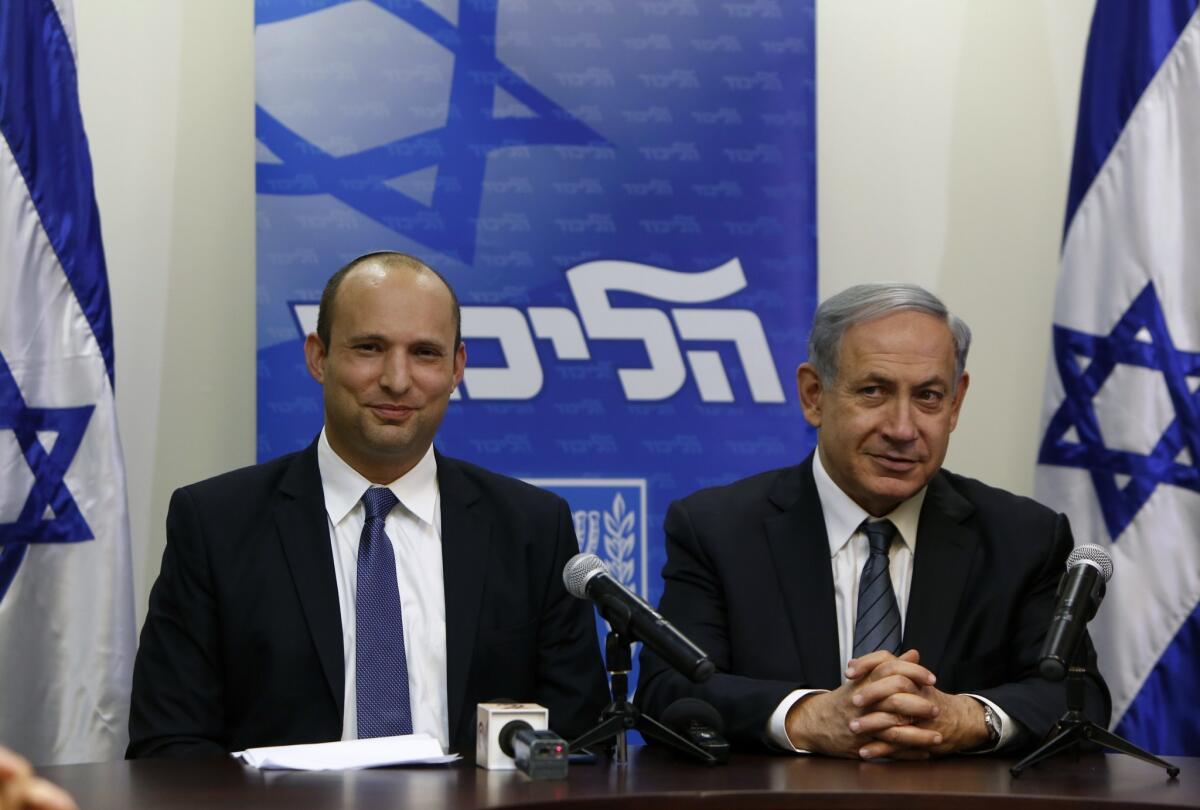Netanyahu faces tough task of ruling with slimmest of majorities

Israeli Prime Minister
Winning the recent Israeli elections may have been the easiest part for Israeli Prime Minister Benjamin Netanyahu, whose new government -- his fourth -- promises to be a challenge even before it has taken office.
Shortly before the deadline Wednesday, Netanyahu announced that he had secured a majority for forming Israel’s next government. But his emerging coalition of five political parties represents only 61 of the Knesset’s 120 seats, the smallest majority possible.
The new government is to be sworn in next week, but its predicament already was becoming clear Thursday.
Though a narrow majority can enhance cohesion, with everyone’s political survival tightly linked, it can also put Netanyahu at the mercy of a single member, who could cause the government to collapse.
The slightest objection could block, for example, the socioeconomic reforms promised by intended Finance Minister Moshe Kahlon -- potentially a key issue, considering the government’s first challenge will be passing a budget. Netanyahu’s previous government failed to do so and imploded amid fierce disagreement between the prime minister and then-Finance Minister Yair Lapid.
Netanyahu’s new government, made up of religious, right-wing and centrist parties, is expected to remain conservative to hawkish on the Palestinian issue and settlements, and has already been criticized by the Palestinian Authority.
Chief Palestinian negotiator Saeb Erekat said in a statement Thursday that the structure of the new government has proved that peace is not on its agenda.
“This new right-wing, extremist government is not a partner for peace when the leaders call for the annexation of Palestinian land, forcible transfer of the Palestinian population, and the genocide against our people,” he said.
Nabil abu Rudaineh, a spokesman for Palestinian Authority President Mahmoud Abbas, said that Israel must accept the two-state solution and halt settlement activities if the peace process is to be revived. If not, he said, the Palestinian Authority will continue efforts to challenge Israel before the United Nations Security Council and the International Criminal Court.
A White House statement said President Obama was looking forward to working with Netanyahu and his new government, emphasizing the close partnership and security cooperation between the two countries, along with “the importance of pursuing a two-state solution.”
The new government is expected to push conservative legislation and move to curb the influence of Israel’s liberal supreme court, as well as restrict the activities of rights organizations, flagship agendas of intended Justice Minister Ayelet Shaked, a right-wing political meteor and the sole woman in the government.
A narrow government majority means a large opposition, which promises to be feisty as all members pledge to fight Netanyahu from different directions.
In a news conference Thursday, opposition leader Isaac Herzog of the dovish Zionist Union party criticized Netanyahu for caving in to the demands of coalition partners, in particular the Jewish Home leader Naftali Bennett, whose eight-seat party held out on joining the coalition until the last moment.
The new government’s agenda would lead to continued investment in the settlements in East Jerusalem and the West Bank, aggravating the diplomatic deadlock, as well as undermine social and minority rights and threaten the rule of law, Herzog said.
Earlier Thursday, a spokesman for Netanyahu said that the prime minister would be keeping the foreign affairs portfolio for now but that it was earmarked for Herzog if he agreed to join the coalition.
In Israel’s parliamentary system, coalitions are somewhat modular and can be expanded or otherwise altered. It is widely assumed that Netanyahu will seek to expand his narrow government.
However, Herzog publicly rejected the possibility Thursday. “We will not be a fifth wheel.” He said he had no intention of “saving Netanyahu from the hole he has dug for himself.”
Sobelman is a special correspondent. Special correspondent Maher Abukhater in Ramallah, West Bank, contributed to this report.
More to Read
Start your day right
Sign up for Essential California for news, features and recommendations from the L.A. Times and beyond in your inbox six days a week.
You may occasionally receive promotional content from the Los Angeles Times.






